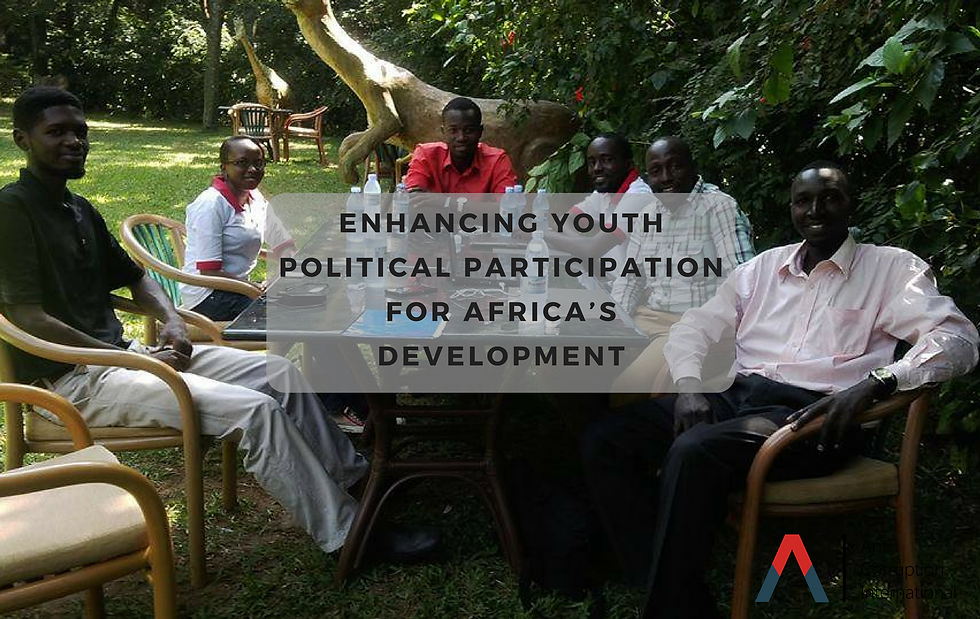Enhancing Youth Political Participation for Africa's Development
- Kudzai Goremusandu
- May 25, 2017
- 4 min read
Citizen participation in decision-making brings about sense of belonging and effective service delivery. Africa is a continent of the young. In 2015, of a total population of close to 1.2 billion people, an estimated 541 million (45.1%) were under the age of 18. A further 458 million (38.2%) were between the ages of 18 and 45. Young people between the ages of 15 and 35 constitute one-third of Africa’s population. However, youth’s influence on national politics remains limited. Young people need leadership opportunities to be able to gain experience and fulfill their potential. It is important, therefore, to integrate young people at the helm of both the political and non-profit sectors. Recognizing that young people, like all people, want to be appreciated for the role that they play in society, they need viable avenues through which they can use their abilities and talents to make positive contributions.
Many young people in Africa look for political opportunities or try to create opportunities for participation, only to find their ideas resisted or rejected. In the absence of such opportunities, they are more likely to find other avenues of expressing frustration and form alternative groups in order to feel a sense of belonging for example #This Flag, a social group in Zimbabwe which caused social unrest in Harare (the capital city). If young people are not given viable means of political participation, they can pose a threat of up rise in societies. The result of some governments in Africa of failing to constructively engage youths is that their potential is often lost or diverted.
FACTORS SPECIFICALLY INFLUENCING YOUTH POLITICAL PARTICIPATION
INCLUDED THE FOLLOWING:
*Distrust of politics and political parties. In many African countries for example Zimbabwe youth associate African politics with politicians who are corrupt, dishonesty and they do not fulfill their promises. Many youths avoid politics, and preferably become active within civil society.
*Distrust of electoral processes and institutions. Countries such as Burkina Faso, Kenya, Tanzania, Malawi, Gambia, Zimbabwe and Zambia have experienced disputed election results and in some cases, discrepant vote-tallying systems used by candidates and by electoral institutions. Perceptions of problems with the reporting of results in Africa has led to skepticism about electoral processes, and raised questions of transparency and the independence of institutions. Hence many youths hesitate to vote due to the electoral system error.
*Under-representation within government and political parties. In many countries for example Zambia and Kenya, youths feel that they are targeted by politicians seeking votes during election campaigns. However, once elections are over, they are not adequately represented in political parties or in government. Even when young candidates are elected, they often feel they have no political power, and are excluded from the decision-making processes. Many Africans feel their peers would not be more likely to turn out at the polls if more young candidates are appointed to meaningful, influential and prominent positions.
FACTORS HINDERING YOUNG CANDIDATES RUNNING FOR ELECTED OFFICE
INCLUDED:
*Patronage and resources. Young candidates are affected by political patronage networks and a lack of financial resources as obstacles if they are interested in running for elected office. Well-resourced candidates and political parties in a number of African countries for example Zambia they buying support through giving away cash and gifts, such as maize.
*Age limits in electoral law. A number of African countries for example Zimbabwe has age limits in their electoral laws, which prevented candidates under the age of 35 or 40 from contesting national elections.
*Inter-generational differences. In some African countries for example Gambia, youths are discouraged from running for elected office because of perceptions that leadership should be reserved for older people
RECOMMENDATIONS
Youth Empowerment through Civic Education
Education activities aimed at improving the participation of youths in political leadership should prioritize leadership training with an emphasis on management skills and accountability so that when elected, young politicians can continue to play an important role in inspiring others to participate in politics. Second, “youth for youth” role models should be encouraged. As more youth gain leadership positions in political parties, it is important that they help to educate other young people.
Finally, political party procedures should be standardized and institutionalized in order to create predictable legal and constitutional frameworks that would enable hardworking, determined, and committed youth to navigate the political system.
Strengthening public policy making skills
The youth constituency in Africa is too large to remain on the margins of the democratic process. African political parties must engage in multifaceted programmes and start thinking more creatively about how to bring youth on board.
Specifically, political parties need to start taking a more proactive approach to engaging with youth as voters, electoral candidates and electoral managers. This, in turn, requires political parties to engage more effectively with key partners on youth- related issues. Two actors of particular importance are political parties and civil society organizations.
Political parties remain a significant barrier to youth participation in decision-making structures through their control over the submission of the lists of electoral candidates. Political parties should therefore consider facilitating inter-party dialogue to foster broader agreements on the need for the advancement of youth as electoral contestants.
Furthermore, by working with youth-led or youth-focused civil society groups, political parties are more likely to achieve their goals when it comes to promoting youth as voters. Political parties also need to look at their own internal structures and policies to promote youth participation in the management of electoral processes
Kudzai Goremusandu is a strategic, innovative, dynamic, goal getter, enterprising young leader. He can be contacted @ kgoremusandu@gmail.com








Comments